
Night and Day is the fifth studio album by Joe Jackson, released in June 1982. It reached the Top 5 in both the UK and US, Jackson's only studio album to do so in either country. It sold over one million copies, earning platinum disc status. It also quickly achieved platinum status in Canada.
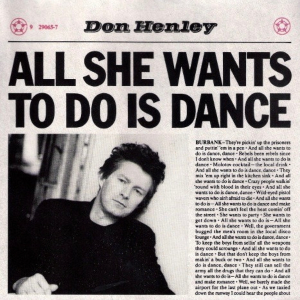
"All She Wants to Do Is Dance" is a song written by Danny Kortchmar and performed by Don Henley, co-lead vocalist and drummer for Eagles. It was released as the second single from Henley's second studio solo album, Building the Perfect Beast, being Henley's sixth single. It was one of Henley's most commercially successful singles. The song is a critique to the US intervention in Central America, particularly in the then-ongoing Contra War, which the Reagan administration funded the Contras, to overthrow the left-wing Sandinista government in Nicaragua.

Big World is a 1986 live album of original songs by Joe Jackson. The album was recorded in front of an invited audience at the Roundabout Theatre, East 17th Street in New York City on 23, 24 and 25 January 1986. The songs are loosely linked by lyrics covering a general theme of post-World War II international relations and global travel.
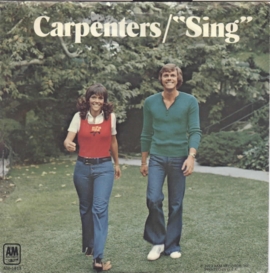
"Sing" is a 1971 song written by Joe Raposo for the children's television show Sesame Street as its signature song. In 1973, it gained popularity when performed by Carpenters, a #3 hit on the Billboard Hot 100.

"Hungry Like the Wolf" is a song by the British new wave band Duran Duran. Written by the band members, the song was produced by Colin Thurston for the group's second studio album Rio. The song was released in May 1982 as the band's fifth single in the United Kingdom. It reached no. 5 on the UK Singles Chart, and received a gold certification by the British Phonographic Industry (BPI).

I'm the Man is the second album by English musician Joe Jackson, released in October 1979. Released shortly after Jackson's breakthrough debut, Look Sharp!, I'm the Man saw Jackson continue the style of his earlier album. Singles from the album included "I'm the Man" and "It's Different for Girls", the latter of which was his biggest UK chart single, peaking at number five on the UK Singles Chart.
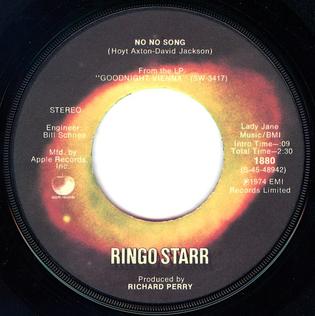
"No No Song" is a 1974 song by English musician Ringo Starr. Written by Hoyt Axton and David Jackson, it appeared on Starr's 1974 album, Goodnight Vienna. It was released as a single in the US on 27 January 1975, backed with "Snookeroo," and reached No. 1 in Canada, #3 in the Billboard charts and reached No. 1 on Cash Box charts in the US.

Body and Soul is the seventh studio album by English singer-songwriter Joe Jackson, released on 14 March 1984 by A&M Records. Jackson's first fully digital project, it peaked at No. 14 in the UK, while in the US it reached No. 20. Described by one reviewer as a sophisti-pop album, the tracks are a mix of pop, jazz and Latin music, showcasing the hit single "You Can't Get What You Want ". Two other singles fared well, with "Happy Ending" charting in five countries, and "Be My Number Two" enjoying moderate success in the UK.

"Is She Really Going Out with Him?" is a song written and performed by British musician Joe Jackson. It was released in October 1978 as his debut single and was later included on Jackson's debut album, Look Sharp! The track was one of the first Jackson recorded with his new backing band, a band he would perform with for his first three albums. Written as a humorous commentary on women dating unattractive men, the song contains a prominent bass line and a chorus praised by critics as memorable. Jackson has since stated that the song's reputation for being angry was untrue.

Live 1980/86 is a Joe Jackson double live album, released in May 1988. It was recorded during the 1980 Beat Crazy tour, the 1982-83 Night and Day tour, the 1984 Body & Soul tour, and the 1986 Big World tour. Notably, the album contains three different versions of "Is She Really Going Out with Him?"

"Cherry, Cherry" is a 1966 song written, composed, and recorded by American musician Neil Diamond.
"Feelin' Alright?", also known as "Feeling Alright", is a song written by Dave Mason of the English rock band Traffic for their eponymous 1968 album Traffic. It was also released as a single, and failed to chart in both the UK and the US, but it did reach a bubbling under position of #123 on the Billboard Hot 100. Joe Cocker performed a more popular rendition of the song that did chart in the U.S. Both Traffic's and Cocker's versions appear in the 2012 movie Flight. The song had also been featured in the 2000 film Duets, sung by Huey Lewis.
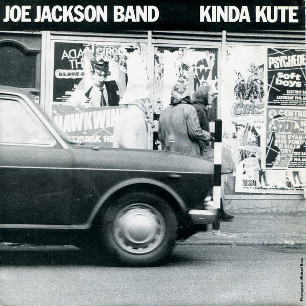
"Kinda Kute" is a song by British singer-songwriter and musician Joe Jackson, which was released in 1980 as the third and final single from his second studio album I'm the Man (1979). Described as a "pop song" by Jackson, the song was written by Jackson and produced by David Kershenbaum. "Kinda Kute" failed to chart in the UK, but reached number 91 on Canada's RPM Top Singles chart.

"Real Men" is a song by British singer-songwriter and musician Joe Jackson, which was released in 1982 as the lead single from his fifth studio album Night and Day. It was written by Jackson, and produced by Jackson and David Kershenbaum. The song became a hit only in the Dutch language area and Australia. In the Dutch Top 40 it reached the 15th position, and in the Flemish Radio 2 Top 30 it reached the 25th position. "Real Men" reached No. 89 in the UK and No. 6 in Australia. A music video was filmed to promote the single, directed by Steve Barron. The song was covered by Tori Amos on her 2001 album of gender-swapped covers, Strange Little Girls.

"Happy Ending" is a song by British singer-songwriter and musician Joe Jackson, which was recorded as a duet with Elaine Caswell and released in April 1984 as the second single from Jackson's sixth studio album Body and Soul. The song was written by Jackson, and produced by Jackson and David Kershenbaum. "Happy Ending" reached No. 58 in the UK Singles Chart and No. 57 on the US Billboard Hot 100.
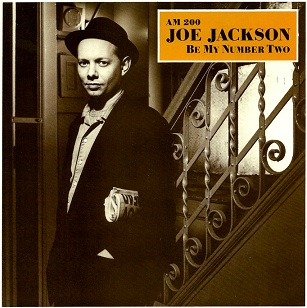
"Be My Number Two" is a song by British singer-songwriter and musician Joe Jackson, which was released in 1984 as the third and final single from his sixth studio album Body and Soul. It was written by Jackson, and produced by Jackson and David Kershenbaum. "Be My Number Two" reached No. 70 in the UK and remained in the charts for four weeks.

"(He's a) Shape in a Drape" is a song by British singer-songwriter and musician Joe Jackson, which was released in 1988 as a single from the soundtrack album of the American biographical comedy-drama film Tucker: The Man and His Dream. The song was written and produced by Jackson.

"I Can See It" is a song by English synthpop duo Blancmange which was released in 1986 as a non-album single. The song is a re-recorded version of "Why Don't They Leave Things Alone?", which appeared on the duo's third studio album Believe You Me (1985). It was written by Neil Arthur and Stephen Luscombe, and produced by Greg Walsh. "I Can See It" reached number 71 in the UK Singles Chart and remains the duo's last appearance in the chart. Shortly after the single's release, Blancmange decided to disband.

"Down to London" is a song by British singer-songwriter and musician Joe Jackson, which was released in 1989 as the second single from his eighth studio album Blaze of Glory. The song was written and produced by Jackson.

"Slide" is a song by Scottish pop band The Big Dish, which was released in 1986 as the third single from their debut studio album Swimmer. The song was written by Steven Lindsay and produced by Ian Ritchie. "Slide" reached No. 86 in the UK Singles Chart in May 1987 and remained in the Top 100 for two weeks.



















